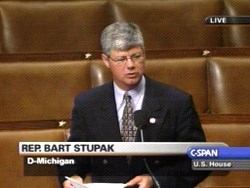NEWS RELEASES
MICHIGAN DEPARTMENT OF ENVIRONMENTAL QUALITY
CONGRESSMAN BART STUPAK 1ST CONGRESSIONAL DISTRICT OF MICHIGAN
************************* DEQ announces decision on Kennecott Mine The Department of Environmental Quality has announced its decision to approve a series of permits to the Kennecott Eagle Minerals Company to conduct mining operations at the proposed Eagle Project Mine near Marquette.
The department's decision follows a period of extensive review by the DEQ of public comments and supporting information to determine whether Kennecott's proposal met the strict standards contained within Michigan's air quality, groundwater and mining laws.
The DEQ is required to make its decision based solely onwhether a proposal meets those standards.
"This has been one of the most thorough reviews of an application ever done by this agency," said DEQ director Steven E. Chester. "In the end, Kennecott's proposal met the high standard set by Michigan's environmental laws."
This project is the first to be subject to Michigan's new Nonferrous Metallic Mineral Mining rules that were enacted in response to concerns over potential environmental impacts from mining of metallic sulfide ores.
The rules, among the most stringent in the nation, were drafted and agreed to by a multi-stakeholder work group that included representatives from environmental, business and mining organizations.
Director Chester noted that information received during the public comment period resulted in a number of changes to Kennecott's permits to alleviate concerns that were expressed by the public and ensure that Michigan's resources are protected.
"We have made every effort to address the public's concerns within the limits of what the law allows," said Director Chester. "We must now remain vigilant in ensuring that Kennecott complies with its permits and lives up to its end of the bargain in keeping Michigan's environment safe."
Examples of changes made to the permits during the public comment period include:
- Limiting the mining activities to elevations below 327.5 meters to address concerns about the stability of the mine. Mining will only be allowed above that level when approved in writing by the DEQ based on further field investigations and analysis to be conducted by Kennecott
- Requiring annual certification that the rock stability is sufficient and providing for immediate work stoppage and notification to the DEQ if stability is questionable
- A requirement for a filter system in the mine shaft ventilation stack that will result in a significant decrease in particulate matter emissions
- A comprehensive fugitive dust plan
- Setting maximum daily limits for all groundwater parameters, and increased monitoring requirements.
Kennecott must still acquire a surface use lease from the Department of Natural Resources for the project.
A list of all permit changes and supporting information can be found on the DEQ website; [after going there] click on Kennecott Eagle Project.
************************* Stupak statement on DEQ approval of Kennecott Mine
WASHINGTON - The Michigan Department of Environmental Quality (DEQ) announced Friday the final approval of permits for a sulfide mine northwest of Marquette to be operated by Kennecott Minerals Company, a subsidiary of Rio Tinto.
The following statement may be attributed to Congressman Bart Stupak (D-Menominee):
“I am disappointed DEQ has decided to approve permits for Kennecott’s sulfide mine in northwest Marquette County along the Yellow Dog River.
"Having had time to thoroughly review the information, there are a number of concerns I have which still need to be addressed.
“I am not opposed to mining. I remain very supportive of mining in the U.P.
"However, these permits represent the first time the state is allowing sulfide mining.
"State officials must take their time and make sure sulfide mining is safe.
"It is critical that comprehensive independent studies be completed before additional permits are issued.
"Once permitted, I am fearful as many as six additional sulfide mines will be allowed to operate on the shores of the Great Lakes, jeopardizing the world’s largest body of fresh water.
“DEQ has allowed their permits without requiring an Environmental Impact Statement to be completed.
"I also believe comprehensive baseline hydrological and geological studies should be conducted by an independent third party.
"While DEQ has, as I have advocated, required Kennecott to provide a financial assurance bond, I remain concerned that the negotiated agreement does not provide enough funding and does not cover a long-enough period to address potential contamination.
"Environmental damages often do not surface until years after a mine is out of operation and can be costly for local and state governments to clean up.
"Contaminated sites cost significantly more to clean-up than the $17 million set aside for this project.
"With the seepage of kiln dust into Lake Michigan at Bay Harbor, CMS estimates $93 million will be needed to abate the environmental damage, and the ground water leakage has not yet stopped.
"We must make sure the state and local community won’t be left with an expensive clean-up years down the road.
“I also have significant concerns, given the state of Michigan’s budgetary situation, that DEQ will not have adequate resources to ensure Kennecott is complying with all safety and environmental standards that it has promised to meet.
"The proposed sulfide mine will require well-trained inspectors to enforce air and water pollution control standards established in the permits.
"The Kennecott Company, rather than the taxpayers, should be responsible for providing the state with the funding needed for the inspectors.
“The Kennecott Company has yet to prove the sulfide mine will not degrade the community, watershed, air quality or ecology of the area.
"While the DEQ permits have been approved, additional permits are required by the U.S. Environmental Protection Agency and the Michigan Department of Natural Resources.
"I will continue to urge EPA and DNR to thoroughly review this proposed sulfide mine.”
*************************
